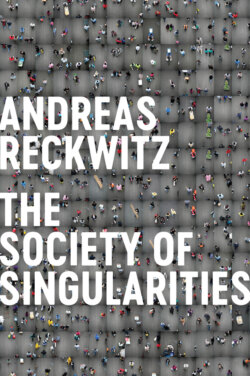Читать книгу Society of Singularities - Andreas Reckwitz - Страница 9
Notes
Оглавление1 On cultural capitalism, see Jeremy Rifkin, The Age of Access: The New Culture of Hypercapitalism, Where All of Life is a Paid-for Experience (New York: Putnam, 2000); and Pierre-Michel Menger, The Economics of Creativity: Art and Achievement Under Uncertainty (Cambridge, MA: Harvard University Press, 2014). 2 Although here I am using the terms “singular,” “unique,” and “particular” as synonyms, over the course of this book I will distinguish various social forms of the particular. 3 See David Riesman, The Lonely Crowd: A Study of the Changing American Character (New Haven: Yale University Press, 1950). 4 See Ulrich Beck, Risk Society: Towards a New Modernity, trans. Mark Ritter (London: Sage, 1992). 5 For a socio-economic discussion of this concept, see Lucien Karpik, Valuing the Unique: The Economics of Singularities (Princeton University Press, 2010). For a cultural-anthropological viewpoint, see Igor Kopytoff, “The Cultural Biography of Things: Commoditization as Process,” in The Social Life of Things: Commodities in Cultural Perspective, ed. Arjun Appadurai (Cambridge University Press, 1986), pp. 64–91. Kopytoff and Karpik have been my two greatest sources of inspiration. My use of the concept of the singular or singularity differs from the way that it is used by artificial-intelligence researchers or by transhumanists such as Ray Kurzweil. See the latter’s The Singularity is Near: When Humans Transcend Biology (New York: Penguin, 2005). 6 See Immanuel Kant, Critique of Pure Reason, trans. Paul Guyer and Allen W. Wood (Cambridge University Press, 1998), pp. 172–8; Kant, Critique of the Power of Judgement, trans. Paul Guyer and Eric Matthews (Cambridge University Press, 2000), pp. 271–84. For a brief overview of Kant’s discussion, see Rainer Kuhlen, “Allgemeines/Besonderes,” in Historisches Wörterbuch der Philosophie, vol. I, ed. Joachim Ritter et al. (Basel: Schwabe, 1971), pp. 181–3. 7 William I. Thomas and Dorothy S. Thomas, The Child in America: Behavior Problems and Programs (New York: Knopf, 1928), p. 571. 8 See Michael Thompson, Rubbish Theory: The Creation and Destruction of Value (New York: Oxford University Press, 1979); and Beverley Skeggs, Class, Self, Culture (London: Routledge, 2004). 9 See Max Weber, “Author’s Introduction,” in The Protestant Ethic and the Spirit of Capitalism, trans. Talcott Parsons (New York: Charles Scribner’s Sons, 1930), pp. 13–31. 10 See David Frisby, Fragments of Modernity: Theories of Modernity in the Work of Simmel, Kracauer, and Benjamin (Cambridge: Polity, 1985); Sam Whimster, “The Secular Ethic and the Culture of Modernism,” in Max Weber, Rationality, and Modernity, ed. Sam Whimster and Scott Lash (London: Routledge, 1987), pp. 259–90; and Volker Gerhardt, Pathos und Distanz: Studien zur Philosophie Friedrich Nietzsches (Stuttgart: Reclam, 1988), pp. 12–45. 11 In a sense quite different from that proposed by Eric Hobsbawm in his book The Age of Extremes: The Short Twentieth Century, 1914–1991 (London: Michael Joseph, 1994). 12 On the concept of infrastructure, see Susan Leigh Star, “The Ethnography of Infrastructure,” American Behavioral Scientist 43 (1999), pp. 377–91. 13 See, for instance, Priya Hays, Advancing Healthcare through Personalized Medicine (Boca Raton, FL: CRC Press, 2017). 14 Of course, economic and cultural processes of transformation outside of Europe and North America have had a different form and a different rhythm. In no way is it possible to proceed from the assumption that these regions have simply copied Western patterns. Rather, it is necessary to take into account hybrid forms and “multiple modernities,” which would require precise case studies for each individual region of global society. 15 For a similar understanding of the role of critique, see Michel Foucault, “What is Enlightenment?” in The Foucault Reader, ed. Paul Rabinow (New York: Pantheon Books, 1984), pp. 32–50. 16 Andreas Reckwitz, The Invention of Creativity: Modern Society and the Culture of the New, trans. Steven Black (Cambridge: Polity, 2017). 17 Under modern conditions, the social logic of singularities is often (if not always) associated with a regime of cultural novelty. The aestheticization of the social can be understood as an element of the culturalization of the social.
